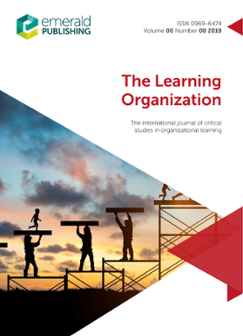Table of contents
Implications of complexity and chaos theories for organizations that learn
Peter A.C. SmithIn 1996 Hubert Saint‐Onge and Smith published an article (“The evolutionary organization: avoiding a Titanic fate”, in The Learning Organization, Vol. 3 No. 4), based on their…
Learning as an activity of interdependent people
Ralph StaceyThis paper argues that to talk about organisations learning is to reify and anthropomorphise organisations. Instead of thinking of an organisation as if it were a thing or a…
Cultural complexity: a new epistemological perspective
Marie‐Joëlle Browaeys, Walter BaetsCulture is a complex process. Many authors show the importance of the concept of culture in organizations. The question which arises is how to approach the cultural problematic of…
A complex adaptive perspective on learning within innovation projects
Saskia HarkemaInnovation is the lifeblood of companies, while simultaneously being one of the most difficult and elusive processes to manage. Failure rates are high – varying between six out of…
Third possibility leaders: the invisible edge women have in complex organizations
Birute Regine, Roger LewinComplexity science may be described as a feminine science because it demands holistic thinking, something that women are generally better at than men. A total of 50 women leaders…
From theory to practice: using new science concepts to create learning organizations
Charlotte D. Shelton, John R. DarlingFor the past ten years the management literature has increasingly discussed the concept of learning organizations. Yet, more that a decade later, few organizations have figured…
Learning dialogically: the art of chaos‐informed transformation
Frans M. van Eijnatten, Maarten C. van Galen, Laurie A. FitzgeraldA decision to don the chaos lens, adopt dialogue as its primary mode of communication, and to recognize the power of the organizational mind has fundamentally and irreversibly…

ISSN:
0969-6474Online date, start – end:
1994Copyright Holder:
Emerald Publishing LimitedOpen Access:
hybridEditor:
- Professor Nataša Rupčić